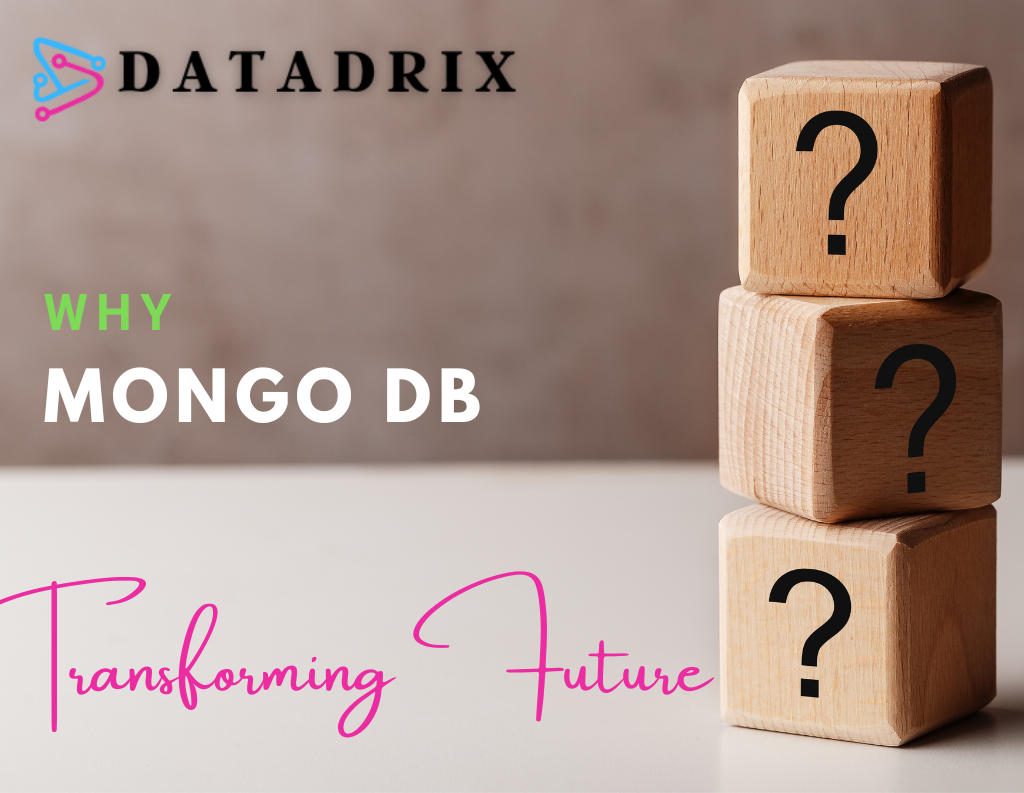
DATADRIX : MongoDB
Unleash the Power of NoSQL with MongoDB
MongoDB is a leading document-oriented database, widely used for its scalability and flexibility. Our comprehensive training program delves into MongoDB’s fundamentals, teaching you how to store, manage & query data efficiently. Whether you’re new to databases or a seasoned developer, our expert instructors guide you through designing schemas, performing complex queries & optimizing database performance. You’ll gain hands-on experience in working with real data & by the end of the course, you’ll be well-prepared to tackle real-world data challenges. Whether you’re building modern web applications, working with big data, our MongoDB course equips you with the skills to excel in the dynamic world of data management.
MongoDB Course
A Comprehensive Course to Database Querying and Management
Dive into the world of NoSQL databases with our MongoDB course. MongoDB is a leading document-oriented database that empowers organizations to manage and access their data with unparalleled flexibility. Our comprehensive program is designed for both beginners and experienced database professionals. You’ll learn the ins and outs of MongoDB, from data modeling and querying to advanced topics like replication and sharding. Through hands-on exercises and real-world projects, you’ll gain practical experience and be well-prepared to tackle data challenges in a modern, fast-paced world.
In an age where data is king, MongoDB offers an excellent solution for flexible and efficient data storage. Our MongoDB course delves deep into the intricacies of this NoSQL database system, ensuring you develop the skills needed to manage and query data effectively. You’ll explore its unique document-based data model, learn how to design and optimize databases, and become proficient in handling large volumes of data. Whether you’re a data professional, a developer, or a database administrator, our course equips you with the knowledge and tools to harness the full potential of MongoDB.
At DATADRIX, we believe in practical learning that translates into real-world applications. Throughout the MongoDB course, you’ll work on projects that simulate actual scenarios you may encounter in your professional journey. Our experienced instructors will guide you through the course, providing insights, best practices, and industry-relevant examples. Upon successful completion, you’ll receive a recognized MongoDB certification, enhancing your credentials and employability. Join us to master MongoDB and become a valuable asset in the rapidly evolving field of data management. Unleash the power of MongoDB and stay ahead in the data-driven landscape with our comprehensive course.
In-Demand Skill: These skills are invaluable for data professionals, developers, and organizations seeking to leverage MongoDB’s capabilities for scalable and high-performance data storage and retrieval.
Beginner-Friendly: Our MongoDB course is designed with beginners in mind. MongoDB is a NoSQL database that offers a flexible and user-friendly approach to data storage and retrieval. In this course, you’ll receive a gentle introduction to databases and learn how to work with MongoDB, making it an ideal starting point for those who are new to database management.
Versatility: This course provides the knowledge and practical experience to harness MongoDB’s adaptability for building modern, data-driven applications that meet a variety of business needs.
Structured Learning: Our MongoDB course offers structured learning to help you master this popular NoSQL database system. You’ll explore the fundamentals of MongoDB, learning how to manage data effectively. Through a step-by-step curriculum, you’ll grasp database design, querying, indexing, and the development of scalable applications.
Hands-On Practice: Our MongoDB course offers hands-on practice in a leading NoSQL database system. MongoDB is renowned for its flexibility and scalability, making it a top choice for managing vast volumes of data in diverse applications.
Customized Learning Paths: This means that learners can choose the areas of MongoDB, a popular NoSQL database, that they want to focus on, whether it’s database administration, application development, data modeling, or performance optimization.
Experienced Instructors: Whether you’re a seasoned developer, a database administrator, or an IT professional, this course equips you with the expertise to excel in managing and optimizing MongoDB databases, making you a valuable asset in the ever-evolving world of data management.
Career Advancement: MongoDB is a popular NoSQL database that is widely used for handling and processing large volumes of data. By enrolling in this course, individuals can learn to work with MongoDB, understand its unique features, and develop the skills necessary to leverage this technology in various industries.
Job Placement Support: Our MongoDB course not only equips you with the knowledge and expertise to work with this powerful NoSQL database but also offers essential job placement support. We understand that securing a rewarding career in the field is a top priority for our learners. With our dedicated job placement assistance, we provide guidance, resources, and connections
Community and Networking: Join the course to learn about MongoDB’s features and applications, and then engage with fellow learners and industry experts to share experiences, insights, and best practices.
Certification: Participants learn how to design, manage, and optimize databases, work with unstructured data, and perform advanced querying. MongoDB is highly sought after in the tech industry, and earning a certification demonstrates proficiency in this valuable skill set
Continuous Learning: You’ll explore MongoDB’s versatile and scalable capabilities, learning how to manage and query data efficiently. As you progress, you’ll develop the expertise to work with large datasets and build robust, data-driven applications.
Ongoing Support: Even after completing the training, you’ll have access to resources and support, ensuring you stay up-to-date with the latest developments in Mongodb and database management.
Embarking on a MongoDB training journey at DATADRIX is an investment in your future, whether you’re just starting your career or looking to further develop your skills. We welcome both fresher and experienced students to join us and explore the exciting world of IT Technologies.

Course Syllabus :
A syllabus is a meticulously crafted document that serves as a comprehensive roadmap for the training program. It plays a pivotal role in guiding candidate along their learning journey, offering a structured framework for acquiring knowledge and honing skills.
A well-designed syllabus offers a bird’s-eye view of the course’s content, complete with a meticulous breakdown of modules or units, well-crafted lesson plans, and a timeline for completion. It doesn’t merely outline what candidate will learn but also lays out the precise learning outcomes and objectives that they’re expected to master by the course’s conclusion.
Embedded within the syllabus are detailed descriptions of each topic, accompanied by a treasure trove of learning resources, suggested readings, and insights into the methods by which knowledge will be assessed. It’s not just a map, it’s a compass guiding candidate through a labyrinth of assignments, projects, exams, and a transparent grading system, making their educational journey as informed and rewarding as possible.
An Awesome Community
Our students, instructors and mentors come from different colleges, companies, and walks of life.
Meet our team and students

Joining DATADRIX means you’ll create an amazing network, make new connections,
and leverage diverse opportunities.

“Validate Your Expertise and Propel Your Career”
- Certification: A testament to your skills and knowledge, certifications demonstrate your proficiency in specific areas of expertise, giving you a competitive edge in the job market.
- Expand Opportunities: Certifications to unlock new career opportunities, gain credibility with employers, and open doors to higher-level positions.
- Continuous Growth: Certifications not only validate your current skills but also encourage continuous learning and professional development, allowing you to stay updated with the latest industry trends and advancements.
Frequently Asked Questions

Who can make career transition into Python
Add context to your column. Help visitors understand the value they can get from your products and services.

What tools will going to cover
Add context to your column. Help visitors understand the value they can get from your products and services.

What is the scope of machine Python
Add context to your column. Help visitors understand the value they can get from your products and services.

Duration and scope of python language
Add context to your column. Help visitors understand the value they can get from your products and services.
